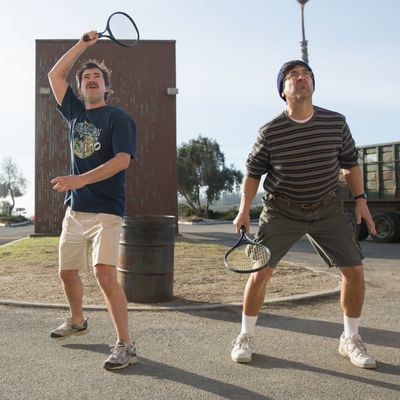
The cancer-buddy movie Paddleton (which premieres today on Netflix) is embarrassingly bad until 20 minutes from the end, when it’s suddenly very good — quiet, tightly focused, stunning. It’s a pity that the first hour needs to be endured, but it does set the stage as well as soften you up for the indelible scene to come.
Ray Romano and Mark Duplass play Andy and Michael, who met when Michael moved into the apartment above Andy. Although Michael seems about a decade younger, they became fast friends, their bond cemented over an original game called Paddleton that’s like squash except you have to bank the ball off the wall into a barrel. It looks fun, in spite of their tedious banter.
They play Paddleton against the back of an old drive-in theater screen — a setting that reminds you, sadly, of the days when people went out to see new movies instead of Netflix-ing them.
These are not terribly swift guys and Andy could be on the spectrum, given his severe social ineptitude (he can’t read people other than Michael) and fixation on a particular kung fu film involving a five-finger death punch. (The pair watch it over and over until you have no choice but to reckon with it as symbolic.) Their simpleminded routine is interrupted by Michael’s news that he has terminal cancer and that, rather than go through a hopeless course of chemo and radiation, he wants to end his life before the pain becomes overwhelming. End it with Andy’s help. First, they need to take a road trip to the kitschy California tourist town of Solvang, the nearest place to obtain the lethal meds from a pharmacy. Oh boy, a road trip.
To get a sense of how excruciating the first hour is, you need to imagine Dumb and Dumber played for tears instead of laughs. Duplass, with a mustache, gives a low-key and generally inoffensive performance, although Michael’s cancer is by far the most distinctive thing about him. (Duplass wrote the script with the director, Alex Lehmann.) Romano, in pointed contrast, goes big — bigger than in his eponymous sitcom. He wears a terrible non-haircut with Jim Carrey–as–Lloyd bangs and has chosen to talk in a strangled, nasal New York voice that I recognized almost at once as Adam Sandler’s — adding a shuddery element to scenes that drag on and on.
Their dialogues feel semi-improvised, but inspiration wasn’t with them on those days and I found myself wishing that a Paddy Chayefsky type had come along and shaped the scenes, as Chayefsky did after transcribing exchanges he heard around New York when writing Marty. And I hate Marty.
A running gag is that others assume that Andy and Michael are a gay couple and that Andy doesn’t dissuade them as quickly as he might. It’s a joke that’s meant to have an element of truth, given that Andy shows no interest in the two women who are friendly toward him (one of them downright forward) and that Michael appears to have no other acquaintances whatsoever. Really, they’re asexual — platonically gay. Most of Paddleton consists of scenes in which Andy — who wants to stall the loss of his partner — obnoxiously takes control and repels other people while Michael tries to cover and get what he wants with being confrontational. The first hour builds to a scene in which Michael finally is confrontational and Andy is very hurt. If Andy had another friend, he would probably call him or her.
Those last 20 minutes are the end stage. It’s one sustained arc, not broken up, the ticking clock a factor. Space and time contract along with Michael’s life. Every second has weight. The small talk is no longer small. Romano’s Andy finally shuts up for long stretches, because what can he say? His will has been definitively thwarted. He finally accepts that this is life. He rises to the occasion.
The best thing about the climax is how easy it feels. Director Lehmann and Duplass follow the natural dramatic line, paring away the inessentials, and so Michael and Andy are no longer just dumb guys but stand-ins for the dying and the left behind — for all of us.


